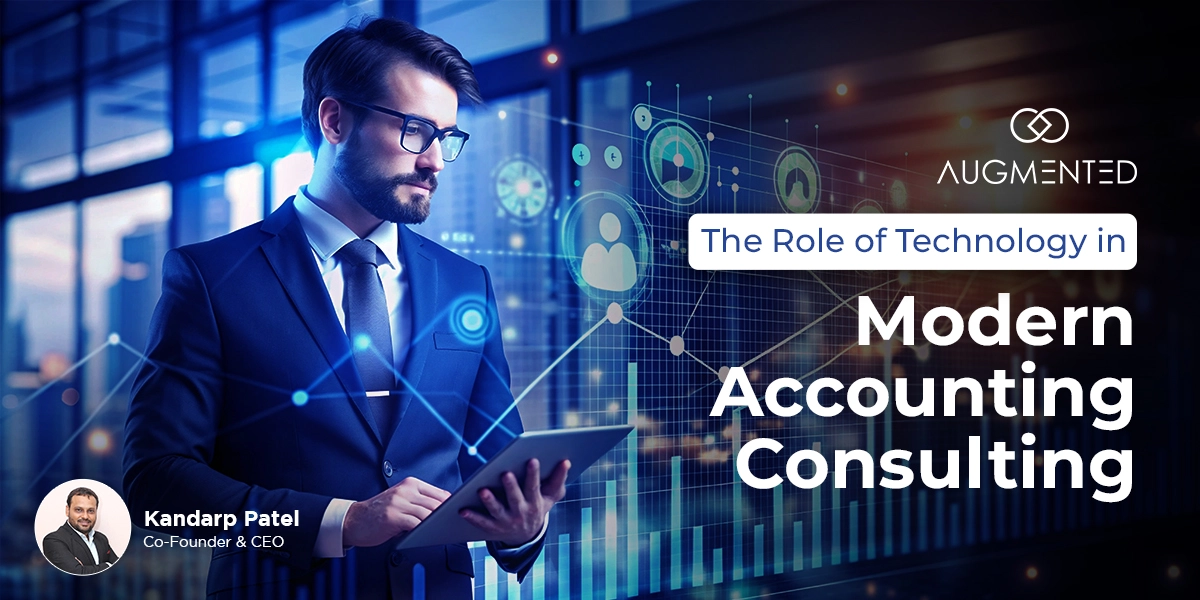Are your on-premise accounting solutions clunky? Are your accounting consultants struggling to keep up with the growing business demands?
The world of accounting is indeed shifting super fast. Automated processes are replacing repeated manual tasks of accounting (apart from many other benefits.)
But the question is how to adapt these advanced technologies without making this transitional change a struggle.
Dig into the blog to see how technology can make accounting a value-added strategy for your business rather than just being a ‘process.’
What is Modern-Day Accounting? How is it Different from Conventional Accounting?
Modern accounting is a combination of conventional accounting systems and new-age technologies. Modern accounting solutions use technology and software to automate processes, reducing the need for manual execution.
While traditionally ‘slow’ and ‘hesitant’ to embrace new technologies, business accounting services are now on the cusp of a transformative era, ready to harness the potential of these innovations.
For Example:
Businesses still relying on manual notes and spreadsheet-based accounting solutions for expense management will:
- Collect receipts and separate them
- Manually enters the expenses into spreadsheets with details of vendors, date, amount and more.
- Finally, reconcile them with bank statements and other financial statements.
This traditional method of accounting when replaced with modern-day accounting software looks something like this:
- Automated collection of receipts with smart or app-based technology
- Extraction and categorization of expenses automatically
- Real-time expense tracking and faster reimbursements
- Elimination of reconciliation with integrated modern accounting solutions
This paper-based system when altered with modern accounting brings more efficiency, accuracy and transparency. But is this all? Is this the only transformation technology brings to business accounting services?
Of course not. There is so much more.
How is Modern-Day Accounting Different from Conventional Accounting?
Traditional accounting involves sorting infinite accounting files and manually recording expenses in ledgers. Today’s technology digitizes bookkeeping and automates tiresome accounting chores.
These changes have impacted various aspects of accounting. Let’s have a look at a few differences in the table below:
The benefits of technology in accounting are changing the landscape. Modern accounting solutions are replacing conventional paper ledgers and books, and accounting consultants are no longer spending endless hours wearing green eyeshades.
But what are these technologies that are converting the once-so-called boring profession into a dynamic and fast-paced success model?
10 Technologies Disrupting Modern-Day Accounting
Gone are the days of heavy ledger books and calculators. Modern accounting solutions no longer keep accounting consultants or chartered accountants up at night.
Modern-day accounting has effectively mitigated the risks of non-compliance with tax laws and procedural errors, making them the ‘nightmares of the past.’
How? Below are the top 10 technologies altering modern accounting.
1. Artificial Intelligence (AI)
AI tools can be custom-trained with financial data to streamline financing. AI mimics human intelligence to make financial decisions and enhance the accounting process.
AI in accounting is helping businesses make better financial decisions. Did you know? AI in marketing is estimated to reach $4.791 billion in 2024, expanding at a CAGR of 48.4%. The benefits of AI-powered tools in accounting are many.
- Reduces time and effort by automating data entry and processing tasks
- Identifies anomalies by detecting fraudulent activities
- Enhances the abilities of accounting consultants to provide actionable insights
- AI analysis of customer data to offer tailored recommendations
Thus get a better edge over your competitors by harnessing the power of AI in your accounting firm.
2. Machine Learning (ML)
ML is a part of AI that uses statistics and data to predict trends and patterns. It utilizes algorithms to analyze big datasets, a job that would take humans ages.
You can swiftly process millions of financial invoices and transactions in real time with machine learning. This lets you make more accurate financial reporting.
Moreover, machine learning algorithms continuously learn and improve with time. Continuous learning helps ML algorithms detect fraud in financial statements.
ML can also help you analyze historical financial data, providing accurate financial forecasts. Moreover, it can identify potential risks for your business.
3. Automation
Accounting automation is software that allows businesses to automate their accounting tasks using automation. Therefore, helping accountants, bookkeepers, auditors and businesses:
- Save time
- Reduce cost
- Eliminate human errors
- Increase productivity
- Foster collaboration
- Enhance efficiency
Automation is transforming accounting, modernizing and minimizing human intervention and helping firms execute tasks flawlessly.
4. Big Data
Big data indicates the massive data collected by businesses from various locations and sources. Big data plays a huge role in financial information and data processing.
- It can analyze transactions
- Detect anomalies
- Foster deeper connections between customers, employees and vendors
- Predict future financial implications
- Provide valuable insights and recommendations
Today big data is the new power tool for accounting. It analyzes massive datasets to predict trends, spot risks and make strategic business decisions.
5. Robotics Process Automation
RPA is a type of business process automation that uses software robots and AI to imitate human actions. Robotic accounting is a type of RPA that uses robotic software to reduce human labor.
With the advent of RPA, the customer support landscape is significantly changing. Customers now interact with chatbots, consult FAQs, and provide feedback through RPA.
This technology is revolutionizing how financial firms and businesses manage everyday tasks such as invoice processing and data entry.
6. Data Analytics
Data analytics helps process raw data to find trends and gain insights. It’s like traveling to the future to access valuable financial insights for your business. (It may not be as accurate as going to the future, but it is the next best thing for accounting.)
You can harness the power of analytics to:
- Improve investment decisions
- Optimize cash flow
- Identify cost savings opportunities
- Develop strategic growth plans
Thus with data analytics, accountants can identify patterns, monitor financial health and make future predictions.
7. Data Security
Invest more to save more. Did you know organizations save approximately $1.76 million when using security AI and automation compared to organizations that don’t?
Businesses are investing in encryption, backup recovery and similar data security solutions to protect their data from hacking, data theft, phishing, and other threats.
A proactive approach to cybersecurity is ‘security by design.’ It means that the software products have already been designed to be fundamentally secure.
8. Block Chain
Blockchain is a type of digital ledger that stores data in blocks that are connected to each other. Cryptocurrency, Bitcoin is a type of blockchain that ensures transparency, integrity, and accuracy of transactions.
It is a tamper-proof ledger that offers,
- Decreased fraud risks
- Reduced business costs
- Automation of routine tasks
- Streamlines auditing process and more
Blockchain is becoming an increasingly emerging technology. In fact, the market size for blockchain technology is predicted to reach $868 million by 2025.
9. Low Code/ No-Code
No Code is an application or software development approach that does not require traditional coding or knowledge of programming languages. It is rapidly evolving to streamline financial tasks in accounting.
It empowers accounting teams and professionals to automate tasks such as:
- Accounts reconciliations
- Journal entries
- Financial statements and more
These no-code apps help teams process financial transactions seamlessly and efficiently when compared to conventional accounting.
10. Cloud-Based Accounting
Cloud-based accounting uses software in the cloud to perform basic accounting processes, such as managing books.
It helps businesses store financial information in a centralized location providing advantages such as:
- Flexible access to accounting information
- Real-time collaboration
- Scalability
- Cost efficiency
- Eliminates device-specific constraints
- Saves time
- Enhances accessibility and security
This shift is replacing spreadsheets with dynamic cloud systems, thus improving business functionalities.
Paper ledgers, journals and spreadsheets have swiftly changed to automation and AI. These technological changes are no more ‘future trends’ but ‘current realities.’ So, leverage these tools and software to scale your business to new heights.
How to Implement Technology in Your Accounting Practice?
Accountants sitting through piles of paper documents to crunch numbers is indeed a talk of the past.
Just being good with numbers is no longer enough.
Businesses and firms now want tech-savvy accounting consultants who keep pace with changing trends. In fact, more than 70% of business owners consider switching to an accountant proficient with modern accounting solutions.
Implementing these technologies is far more interesting than just reading about them. Here’s how you can implement technology in your current accounting practice.
Step 1: Selecting the appropriate tool or software can be challenging. So, thoroughly assess your current accounting infrastructure.
Step 2: Don’t follow the technological accounting bandwagon blindly. Set realistic and clear goals.
Step 3: Research, learn and research again. Understand the emerging technologies in accounting.
Step 4: Choosing the wrong software for modern-day accounting is way worse than not choosing any. Select the right software for your finances.
Step 5: Provide hands-on training to your team.
Step 6: Take data security seriously. The digital era is all about data breaches, malware, and cyberattacks.
Step 7: Implementing modern-day accounting software needs planning, execution and data migration.
But if you are still unsure about implementing these new technologies in your business accounting then outsource because every business is unique.
Outsourcing: A Great Modern-Day Choice for Small and Mid Accounting Firms
Managing finances becomes an added responsibility when running a small or mid-sized accounting firm. Maintaining tax-filing deadlines and regulations and managing clients can be a headache.
These pressures can lead to burnout and poor services. Accounting outsourcing can be a turning point for many small and mid-size accounting firms.
The benefits of outsourcing accounting services are many, including
- Professional and experienced accountants,
- Cost savings, and
- Improved customer satisfaction
So stop feeling overwhelmed with work and find the right accounting partner.
Conclusion
It’s 2024 and there is no stopping in advancements of technologies. To stay connected with the world, enhance business operations, and stay ahead of the competition, modern-day accounting cannot be neglected.
So, if you want to upgrade your business accounting services, Augmented Systems has a team of certified accounting consultants available. Want to know more? Get in touch today.


